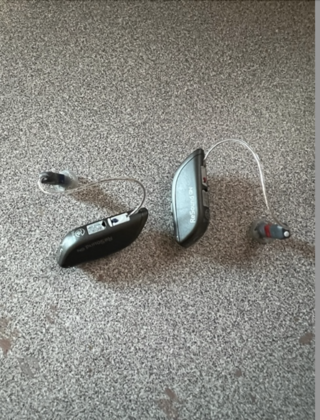Embarrassment
To Rid Myself of Shame About a Disability, I Had To Tell People About It
I learned that the only person who could make me ashamed of a disability was me.
Posted March 8, 2022 Reviewed by Tyler Woods
Key points
- Choosing pride is always better than staying ashamed.
- What anyone thinks about you is really none of your business, because you get to decide how to feel.
- Real bravery is knowing who you are, and, instead of hiding it, wearing it.

For me, shame always had a lot to do with my terror about what people might think. I inherited that from my mom and older sister, both of whom suffered anxiety about anything or anyone, including neighbors, teachers, even strangers. As I grew older, they fed me their fears like a vitamin that might make me strong. There were so many secrets in my family, so much shame around those secrets, and both my mother and my older sister subscribed to the program of never letting people see who you really were, because then everyone would either mock you, hate you, yell at you, or hurt you. In any case, the end result would be you would be alone and shunned.
“Don’t tell your boyfriend you have asthma,” my sister advised. “He’ll think you aren’t as desirable as someone who doesn’t have it.” My mother advised me to exaggerate how sick I was to the doctor so he wouldn’t think I was wasting his time. Everything was always swirling around what others might think of me. But I didn’t want to live like that, and at first, I did all right, insisting on going on the stage for drama club in school (“No one heard you. Some girls were laughing at you,” my sister said later, helpfully adding that the girl behind her had even said, “That’s Caroline Leavitt? She’s not that ugly.”) Later, I went on a book tour and spoke in front of crowds, trying to drown out my mother’s voice booming in my head: “Aren’t you afraid people will get angry about some of the things you wrote?” she asked. I spoke anyway, my legs noodles.
I got happily married and gave birth to a beautiful, perfect son. I got critically ill, and the medications I had to take impaired my hearing. The mother of all shame began: I had hearing loss.
The jokes about hearing loss are everywhere. Old people yelling, “What? What?” Even in the And Just Like That TV show, the spin-off of Sex and the City, the most decent character, Steve, acted like a buffoon about his hearing aids: losing them, mishearing what people were saying for a heightened laugh track. I certainly didn’t want to be seen like Steve. One day, at a reading, someone in the front row asked me a question. “What?” I said. She repeated it. Three times. Finally, disgusted by all my “whats,” she waved her hand. “Forget it,” she said. Behind her, someone tittered.
But how could I forget it? I imagined everyone was still talking about me, wondering if I was stupid or just oblivious, or if they thought I was decrepit because I couldn’t hear that question. I knew I had to be brave about this, so I finally cried to my husband, who instantly and calmly said: go to an audiologist.
My audiologist, Dominick Servedio, was calm and friendly, which put me at ease. He didn’t push hearing aids on me, which made me trust him, and he listened to me telling him how ashamed I was. He understood, and he told me about clients he had who would return their aids because they were embarrassed, or they didn’t like the way they looked. They’d rather pretend they were okay when they clearly were not. And then he did this remarkable thing. “Let’s try something,” he told me. He stepped outside the door and said something to me, and I couldn’t hear it. Then he came inside and fit a hearing aid in one ear and did the same thing. I burst into tears because I could hear everything.
Reader, I bought those aids. I wore them. But I still kept them secret from everyone for years.
But then, I met Jennifer Pastiloff. She’s a writer, yoga teacher, life coach, wife, and young mother. She's gorgeous and she's deaf. She writes about conquering her own crushing shame, and because she had, I thought maybe she could help me. “You better write about it,” she said. “It’ll free you from shame.” And so I did. She printed my piece in The Manifest-Station, the magazine she founded. I waited for the comments, the jokes, the disparagement, and there were some. “What? You wear hearing aids?” a few people said in disbelief. “How awful! Thank God, I’m not there yet.” Some people did laugh. But I was so proud of going beyond my comfort level it didn’t matter.
It was Jennifer who told me about this new, cutting edge, global company ReSound, which is trying to change the story around hearing losses. Instead of cowering in shame, they want people to feel wonderful about the amazing new technology that can give back so much of what you are missing. Shouldn’t hearing aid wearers talk about their aids the way we talk about our eyeglasses? Couldn’t we love our aids the way we love our spectacles?
I grew braver and I contacted the company. “Try them out!” they told me. “If you like them, tell others.”
So I tried them. These new aids put me in a state of awe. The technology was so advanced that it seemed like natural hearing to me, or actually better than what was my natural because just walking to the subway, I could actually hear other conversations in front of and behind me. I swore I could hear microbes. I felt better about myself. Stronger. Braver.
"Tell others," ReSound had advised me. "Help us to change the story." But I had to get braver to do that. I had to bring my shame out into the light. So I started small, with a casual Facebook post about how I used to be so ashamed of my hearing loss, but now I had these amazing new ReSound One hearing aids, and they were changing my life. My heart pounding, I hit send. I kept reminding myself: I’m not ashamed, I’m in awe, and awe is definitely better. I’m rocking this, not hiding it.
To my astonishment, 40 then 60 responses flew in. Emails came in from people who knew me. No one was yelling at me. No one was making me feel ashamed by feeling sorry for me or cracking bad jokes. Instead, people were thanking me for bringing this out into the open. They were asking me all sorts of questions, praising me, so I had to reveal myself even more.
I thought again of how my mother and sister had urged me to keep things hidden because “you don’t want people to think less of you.” Now, I feel like being clear as cellophane, making my inner life more visible, because every time I do, people aren’t thinking less of me. They are thinking more of me. If I think it is life-changing that I can hear with ReSound’s help, who is anyone else to tell me otherwise? I know now that real bravery is knowing who you are, and, instead of hiding it, wearing it.
Caroline Leavitt is the New York Times Bestselling author of 12 novels, most recently With or Without You.




